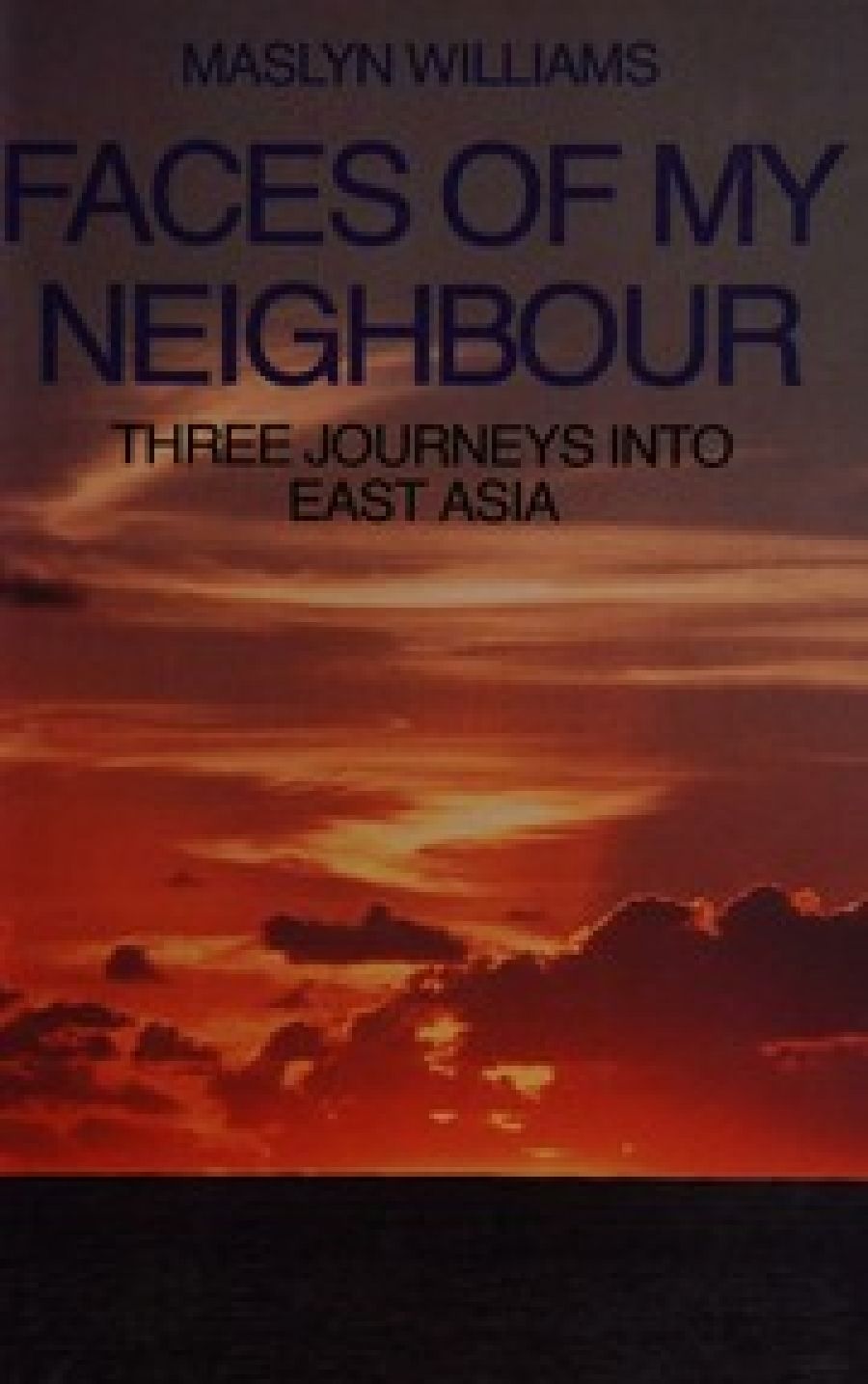
- Free Article: No
- Contents Category: Asian Studies
- Review Article: Yes
- Article Title: Asia’s failed gods
- Online Only: No
- Custom Highlight Text:
On page eleven of this book, Australians are called an engagingly innocent people ‘splendidly unthinking of anything but the simplicities of affluent living.’ On page twelve, they are called ‘lazy and uncreative’. On page 311, the author writes: ‘Yet in spite of a widespread belief (mainly self-generated) that we are a nation of yahoos, we have as much capacity for some unique kind of greatness as the people of any other race and nation.’
- Book 1 Title: Faces of My Neighbour
- Book 1 Subtitle: Three journeys into East Asia
- Book 1 Biblio: Collins, 312 p., $30.00
Mr Williams, for once, ties himself into too many knots. He recently undertook three journeys: to the Philippines, Japan, and South Korea. He tries to weigh the constant in these lands against the transient; native spirituality against cosmopolitan opportunism. No reason why he shouldn’t but he seems to me hampered by moralistic, as distinct from just moral, prejudgements.
To him the ‘West’ has let ‘Asia’ down. Why? Because it has betrayed Christianity. This, of course, one often hears said in the East. But if one listens closely, one also hears that every other god has failed as well, not only Christian capitalism and Marxism, but also Buddhism, Hinduism, and Confucianism.
Mr Williams, therefore, advances from shaky emotional premises. In historical terms the conviction that the Occident is more or less collectively yahoo is just as self-generated as is the notion that Australia is. The psychological foundations for the belief are the same. So strongly does Mr Williams feel on the subject that his conversations with a Christian companion in Korea read like a set-piece; his recall is too flawless.
Lastly, to get the negative out of the way, he is handicapped by his technique. Mostly he was shown round by officials (not always high ones) and he faithfully records what they told him. Then he fairly qualifies their remarks with his own, sometimes quite critical, comments, often interspersing them with bits of potted history.
One senses that Mr Williams may one day wish to return to Manila, to be received as a friend by almost everyone he first met there. (He apparently doubts that this could happen in Seoul.) The blurb says he helps to arrange cultural exchanges; perhaps this has conditioned his approach. While it does not lack independence, it precludes sustained and first-rate reportage. It results in too much reliance on ‘data’: the eye and the notebook tend to get in each other’s way.
But there is plenty of good stuff here. In the Philippines, the background to the Moro war is lucidly explained. A meeting with a politically conscious nun stays in the mind, as does an Easter visit to a rising businessman on the island of Marinduque. The whole State-Church embroglio is well-handled and written about; also the conflict within the Church between the followers of the social gospel and the other gospel. But I still can’t tell what Mr Williams really thinks of the Marcos clan.
The chapter on Japan does not have the punch a good television documentary would have; it deals too much in already known generalities. However, the description of Mr Williams’ last hours in Tokyo is beautifully evocative.
The section on South Korea is the most outspoken and colourful – the oppression of Christians strikes a chord in the writer. An interesting point: he stresses, too, how China’s reforming example works influences even its ideological opponents.
Faces of My Neighbour could help those Australians who are slowly moving away from their entrenched fears to gain a juster idea of what goes on on the mainland to the north of us, where the future is grappling with the past.


Comments powered by CComment